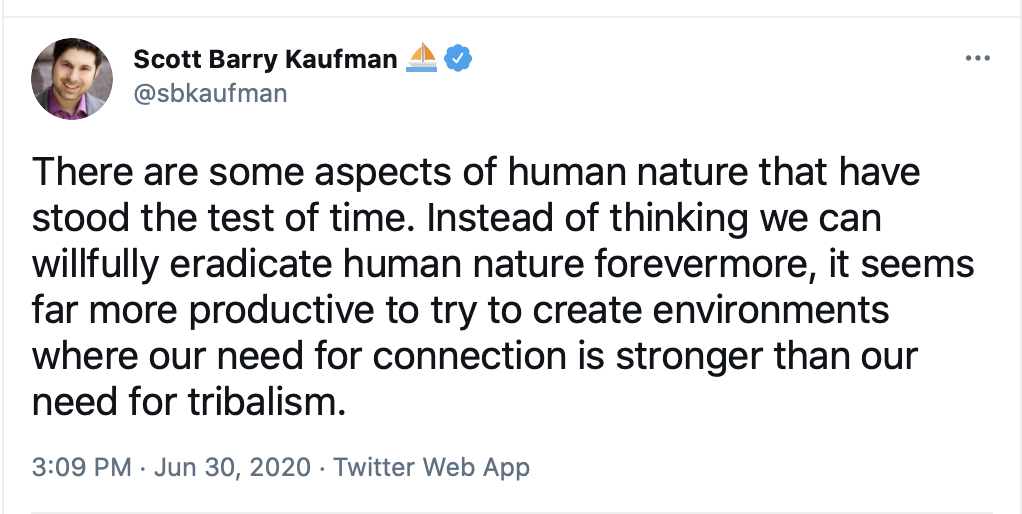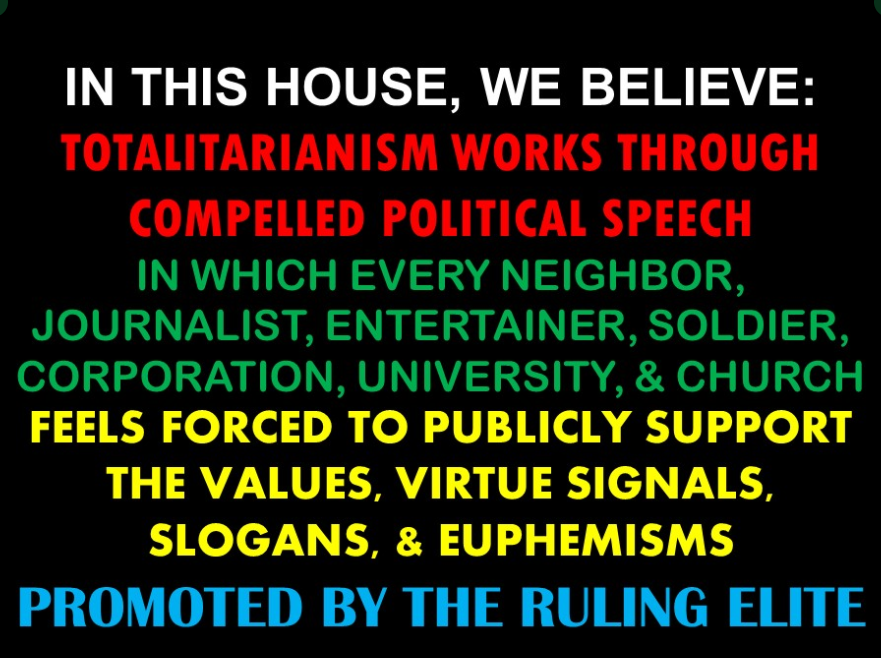Woke anti-CBT Ideology Excels at Producing Adult-Sized Toddlers
Exploding numbers of people are falling prey to Woke ideology. Those steeped in Wokeness claim that they cannot cope with people who challenge their own world view, even slightly. They see offensive ideas (even barely offensive ideas) as a form of “violence.” This is in contrast to the approach used by classical liberals (and many conservatives), who want their ideas to be challenged. Subjecting one’s ideas to the marketplace of ideas is for the betterment of society in the spirit of John Stuart Mill’s book, On Liberty (Free download of an abridged version from Heterodox Academy here). Ideas invite opposing ideas, because they are opportunities to explore, extend and deepen the truth.
Feelings, on the other hand, seek only validation. Feelings clash with opposing feelings and ideas. Wokeness is an ideology that heavily relies on feelings, often seeking to disparage and ridicule the use of Enlightenment approach to learning by the sorts of tactics used by authoritarian dictators, including cancel culture, compelled speech, struggle sessions and censorship. Wokeness has many of the hallmarks of a fundamentalist religion whose main tactic is attempting to silence any person who refuses to bow and give total homage to the ideology.
In The Coddling of the American Mind: How Good Intentions and Bad Ideas Are Setting Up a Generation for Failure (2019), Attorney Greg Lukianoff (President of Foundation for Individual Rights in Education) and moral psychologist Jonathan Haidt have diagnosed America’s mushrooming inability to engage in productive civil discourse (see here for the Atlantic article that was the basis for the book). One of my biggest take-homes from Coddling of the American Mind is that our most visible and powerful sense-making institutions (many universities and media outlets) have allowed the proven healing therapy of CBT (Cognitive Behavioral Therapy) to be turned upside down and used as a weapon for indoctrinating our children and young adults to ever-higher levels of cognitive dysfunction. Although we should sometimes trust our feelings, that is often not a good idea. Our feelings often mislead us into a convoluted moral landscape that destroys human flourishing (the focus of Paul Bloom's book, Against Empathy). When our feelings are substantially misleading us, we might need psychotherapy, such as CBT, which has been repeatedly proven to help people who have the following cognitive distortions:
EMOTIONAL REASONING: Letting your feelings guide your interpretation of reality. “I feel depressed; therefore, my marriage is not working out.”
CATASTROPHIZING: Focusing on the worst possible outcome and seeing it as most likely. “It would be terrible if I failed.”
OVERGENERALIZING: Perceiving a global pattern of negatives on the basis of a single incident. “This generally happens to me. I seem to fail at a lot of things.”
DICHOTOMOUS THINKING (also known variously as “black-and-white thinking,” “all-or-nothing thinking,” and “binary thinking”): Viewing events or people in all-or-nothing terms. “I get rejected by everyone,” or “It was a complete waste of time.”
MIND READING: Assuming that you know what people think without having sufficient evidence of their thoughts. “He thinks I’m a loser.”
LABELING: Assigning global negative traits to yourself or others (often in the service of dichotomous thinking). “I’m undesirable,” or “He’s a rotten person.” NEGATIVE
FILTERING: You focus almost exclusively on the negatives and seldom notice the positives. “Look at all of the people who don’t like me.”
DISCOUNTING POSITIVES: Claiming that the positive things you or others do are trivial, so that you can maintain a negative judgment. “That’s what wives are supposed to do—so it doesn’t count when she’s nice to me,” or “Those successes were easy, so they don’t matter.”
BLAMING: Focusing on the other person as the source of your negative feelings; you refuse to take responsibility for changing yourself. “She’s to blame for the way I feel now,” or “My parents caused all my problems.”
Lukianoff and Haidt point out that the dysfunctions listed above are the symptoms of the current Woke dysfunction on some campuses. We are encouraging this dysfunction whenever we shut down meaningful conversation regarding controversial claims, e.g., that biology makes clear evidence-based distinctions between males and females and that this can be done with a high degree of accuracy at birth. Somehow, in the year 2021, this exact fact-based claim has become, for many, a mark of "bigotry" and “violence.”
Those who have been thoroughly indoctrinated with the opposite of CBT willingly embrace massive disfunction, refusing to give alternate viewpoints charitable readings, focusing on negative possibilities, assuming that other people are threats, shoving people into silos of “good” and “bad” and casting blame for all of one’s frustrations on others, refusing to accept responsibility for changing themselves. Woke ideology has turned numerous people into adult-sized toddlers. And throughout this turmoil, many of the adults running our institutions sit there, “peeing in their pants” (as John McWhorter explains), refusing to say the obvious because they can’t bear to be called names like “racist” by Woke mobs, even when there is no basis for such name-calling. Here is the relevant video (Min 29), where John McWhorter is discussing the problem with many school administrators with Glenn Loury:
Apparently, the entire curriculum has been turned upside down into these endless indoctrination sessions about the nature of racial oppression in the United States, including role playing games and separation of people by race. And all of this being done by people who think of themselves on the side of the angels. This is a school that's been running for 100 years as one of the most innovative and effective educational institutions on earth. And because of the fear that these CRT types inspire in other people--the idea that if you don't agree with them, you're going to be called a racist in public--goodness gracious, that scares people. The whole school has possibly been ruined. Bryn Mawr was essentially taken over by students demanding that kind of ideology as what was taught in all classrooms for weeks, to the point that some people have withdrawn their students from the school. The President, or whatever the head of Bryn Mawr is called, and she should be called out, Kim Cassidy actually gave in to these students and apologized for initially criticizing them for, for example, making other students--frankly most of the student body--scared to their socks for not agreeing to this idea that the education in the school needed to be completely hijacked. This sort of thing is happening in various places. And in each case, CRT fans could say, well, that's extreme, but. But the problem is, this has become a meme nationwide and we only need think about the Princeton letter that we've talked about, which basically implies that Princeton ought to be run by a star Chamber of people deciding what's racist and what isn't.
This whole dialogue is getting a little frightening, I write about it actually, in my latest Atlantic piece, and I have to say, my latest Substack piece. This stuff is scary, and I would bring it up, even if there wasn't my new substack account. This way of looking at things really is becoming overly influential. The reason I'm saying it is overly influential is because it doesn't teach people how to think constructively except about one very narrow thing. And it's not based on any coherent philosophy of education.
It's a religion. This is religion being preached as some sort of higher truth by people, most of whom I doubt consider themselves very religious. So okay, we're not going to have the White House prescribing against critical race theory in education. But on the other hand, we do need to have a conversation if there's going to be a racial reckoning under the Biden administration, as to what that reckoning is going to be. And if the reckoning is going to be that any Black person who decides to exert the performance art of saying that their institution is racist, [they] will have 90% of what they demand given to them, because everybody is peeing their pants, being afraid that somebody is going to call them a bigot on Twitter. This country is in serious trouble. And anybody who wants to tell me that I shouldn't say that until there's no such thing as a right wing militia zealot who might overtake the Capitol? Anybody who says that we can't talk about that until we do something about the idiots on the right?
Well, you know what? Frankly, I don't believe you. I think that really the people who say that just don't want to hear what they know is a truth because they're afraid that somebody is going to call them racist on Twitter if they don't bow down. We've got to sit these people back down--and notice I'm not saying chase them out of the room. But the hyper wokesters need to go back to the way it was 20 years ago when they were one voice at the table. And it does not make anybody a right-wing zealot to feel that what's happening at places like Dalton is deeply, deeply wrong. You can be somebody who's just a good old fashioned liberal.
These cowards, our university administrators and editors at major sense-making institutions, are enabling psychotherapeutic dysfunction on a nationwide scale. They need to stiffen their spines and start speaking up as a group. The Woke activists are a loud shrill minority, even though it doesn't look that way when you read the woke-infested legacy media these days.
As far as a cure, is there, anywhere in the U.S., a clinical psychologist’s office big enough for CBT sessions for tens of millions of people?


